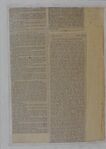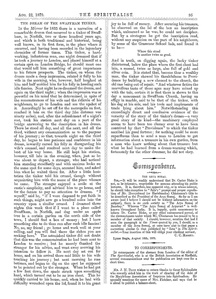 |
vol. title: Vol Four of The Theosophical Society of The Arya Samaj of Arya-wart vol. period: Sept 1878 – Sept 1879 pages in vol.: 350 |
< Black Forest Legends (continued from page 8-339) >
nor salt was to be found on the table, and Kurt von Stein was too much of a gentleman to notice the omission, though he certainly enjoyed his supper the less by reason of their absence.
At length the young man ventured to ask one or two questions of his kindly hostess. “May I inquire,” he said, “are you, fair hostess, the daughter of this house?” “Yes,” was the answer given, as it seemed sadly and low.
“And your parents!”
“They are there,” said the lady, pointing to the pictures on the walls.
“Do you mean to say that you live in this house alone?” asked Von Stein.
“Alone,” returned the lady. “I am the last of my race.”
Who shall say how it came about? The lady was beautiful, the man was young. In such cases love is sometimes found to be a plant that does not take long in the growing. Moreover, Von Stein, though noble, was poor, and the lady the last of her race, the heiress of an ancient lineage. Possibly the notion of the inheritance the lonely girl might bring with her had some part in the sudden passion which tilled the young man’s heart. Who! can tell?
It was not long before he found himself kneeling at her feet and offering the beautiful maiden all that he had to offer—his devotion and his. life.
The lady listened silently, and with bowed head, to his ardent pleading. Thon she said, looking up, but away from him, and speaking absently—“I have heard those words before.”
“But never from lips so true, so honest, so disinterested,” said the young man warmly, forgetting in his fascination for the beautiful lady how he had certainly taken her inheritance into account in the first place.
The lady sighed and was silent.
Then she spoke—“If I yield to your wishes, we must be married at once.”
“At once!” cried Von Stein, perhaps a little startled. Yet what lover ever found the time between betrothal and marriage too short!—“I am ready,” he said gallantly, “and impatient.”
The lady smiled, moved softly away to an old worm-eaten chest which was set against the wall, took from it two rings and a white veil and crown of myrtle, which she laid upon her dark flowing hair. Her dress was white.
“Come” she said to her lover, and led the way.
A little bewildered, after the fashion of bridegrooms in general, and scarcely knowing whether to be happy or alarmed, the young man followed his bride through, as it seemed to him, miles of dimly-lighted vaulted passages, if where the damp was trickling down the walls, and where unthought-of steps, up and down, wore ready at every moment to trip up the unwary passer. The lady, however, seemed to be well acquainted with every turn and twist of the place, and giving her hand to her lover, she led him on, step by step, until at length they reached a vaulted chamber, which they had no sooner entered than a great iron door shut heavily behind them, with a sound that echoed through every arch of the dimly lighted building.
It was the chapel.
“Your hand is cold, my love,” said the young man y tenderly to his bride.
“No matter, yours has warmth and life enough for both,” returned the lady.
Yet the life seemed actually to ebb from the young man’s heart as he observed the stone figure of a bishop, which was sculptured on a gravestone in the centre of the chapel, gradually rise from its recumbent position and walk up the steps of the altar.
The eyes of the bishop flamed like glowworms, the candles upon the altar lighted of themselves, and the tones of an organ rolled solemnly through the vaulted building.
“Kurt von Stein, wilt thou take the Lady of Windeck for thy lawful wife?” said the bishop, in low sepulchral tones, which sounded as though not he, but some muffled voice a dozen yards away, were speaking.
At this moment the whole horror of the scene seemed to break upon the young man. Around him, slowly rising from their graves, he saw the shrouded forms and fleshless faces of the dead who came as witnesses to the ghostly marriage. Even the face of his bride, as his fascinated eyes fixed upon it, wore the livid hue of death, He turned in an agony to fly from the horrible scene, tried to snatch his hand from the cold, hard grip of the phantom-lady—fell, as he believed, senseless upon the chapel floor, .... and awoke to find himself, at dawn of day, laying at his full length on the moss- grown stone where he had sat to rest the night before, at the castle door, and his horse intent upon an early meal on the rank herbage of the grass-grown court.
When he told his tale in the village, and at the neighbouring castles, no one in the least doubted that he had almost, if not quite, laid the unquiet spirit of the Lady of Lauf.
The Dream of the Swaffham Tinker
In the Mirror for 1833 there is a narration of a remarkable dream that occurred to a tinker of Swaff-ham, in Norfolk, two or three hundred years ago, and which is both traditional and historical, being well known, in its first form, in the place where it occurred, and having been recorded in the legendary chronicles of former times. This tinker, a hardworking, industrious man, one night dreamed that if he took a journey to London, and placed himself at a certain spot on London Bridge, he should meet one that would tell him something of great importance to his future prospects. The tinker, on whom the dream made a deep impression, related it fully to his wife in the morning, who, however, half laughed at him and half scolded him for his folly in heeding such idle fancies. Next night he re-dreamed the dream, and again on the third night; when the impression was so powerful on his mind that he determined, in spite of the remonstrances of his wife and the ridicule of his neighbours, to go to London and see the upshot of it. Accordingly he set off for the metropolis on foot, reached it late on the third day (the distance was p ninety miles), and, after the refreshment of a night’s rest, took his station next day on a part of the bridge answering to the description in his dream, There he stood all day, and all the next, and all the third, without any communication as to the purpose of his journey; so that, towards night on the third day, he began to lose patience and confidence in his dream, inwardly cursed his folly in disregarding his wife’s counsel, and resolved next day to make the best of his way home. He still kept his station, however, till late in the evening, when, just as he was about to depart, a stranger, who had noticed him standing steadfastly and with anxious looks on the same spot for some days, accosted him, and asked him what lie waited there for. After a little hesitation the tinker told his errand, though without acquainting him with the name of the place whence he came. The stranger enjoyed a smile at the rustic’s simplicity, and advised him to go home, and for the future to pay no attention to dreams. “I myself” said he, “if I were disposed to put faith in such things, might now go a hundred miles into the country upon a similar errand. I dreamed three nights this week that if I went to a place called Swaffham, in Norfolk, and dug under an apple tree in a certain garden on the north side of the town, I should find a box of money; but I have something else to do than run after such idle fancies! No, no, my friend; go home and work well at your calling, and you will find there the riches you are seeking here.” The astonished tinker did not doubt that this was the communication he had been sent to London to receive; but he merely thanked the stranger for his advice, and went away avowing his intention to follow it. He next day set out for home, and on his arrival there said little to his wife touching his journey; but next morning he rose betimes, and began to dig on the spot he supposed to be pointed out by the stranger. When he had got a few feet down, the spade struck upon something hard, which turned out to be an iron chest. This he quickly carried to his house, and, when he had with difficulty wrenched open the lid, found it to his great <... continues on page 8-341 >
Editor's notes
- ↑ The Dream of the Swaffham Tinker by unknown author, London Spiritualist, No. 365, August 22, 1879, p. 95
Sources
-
London Spiritualist, No. 365, August 22, 1879, p. 95

